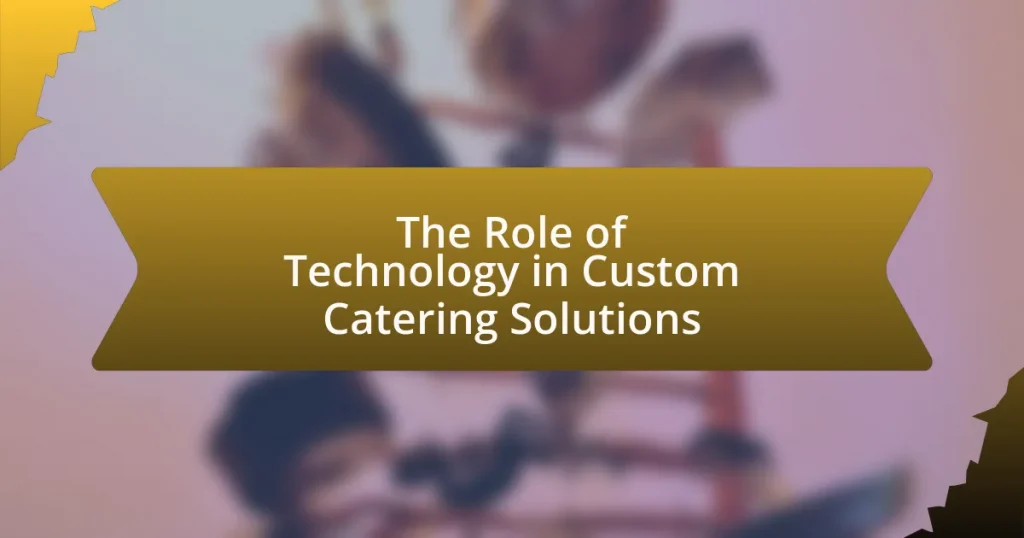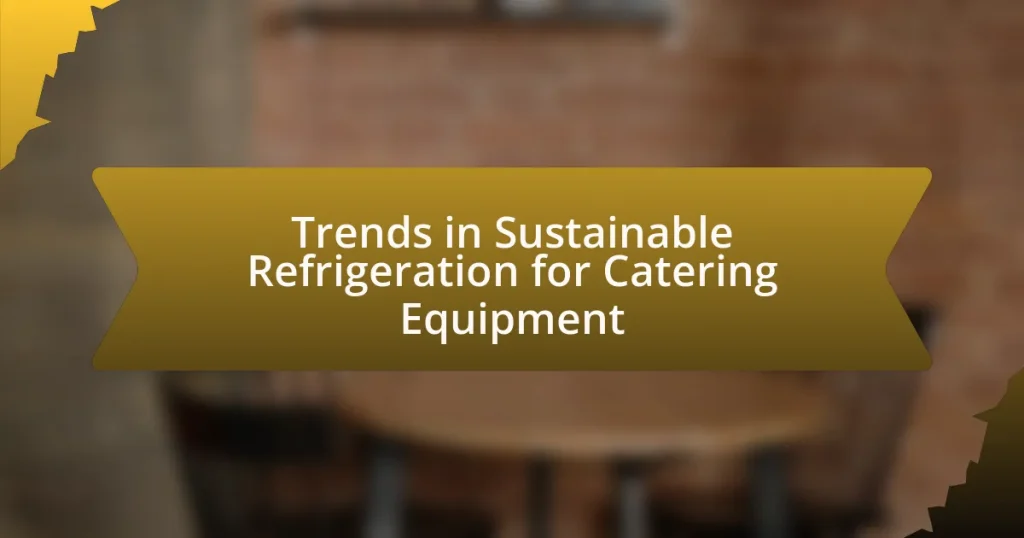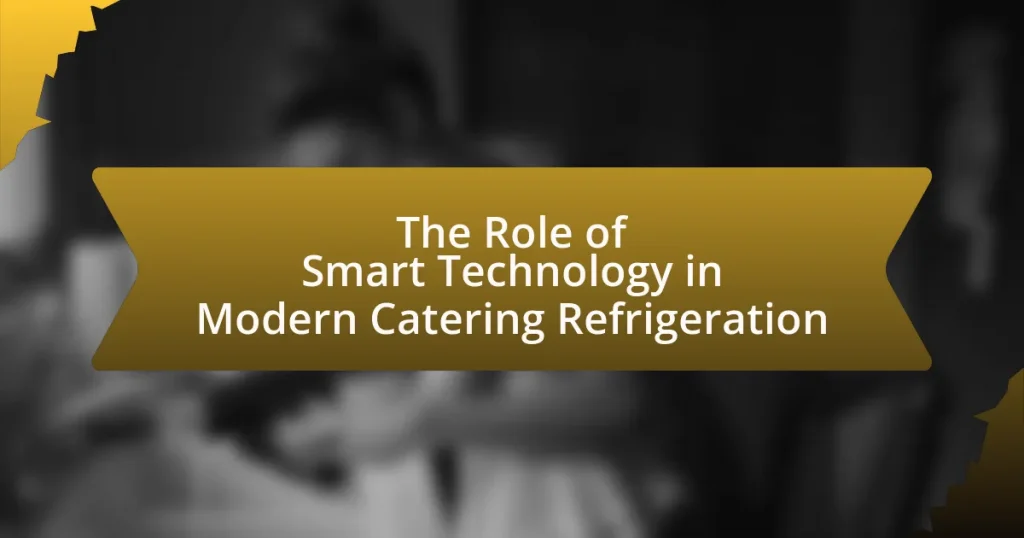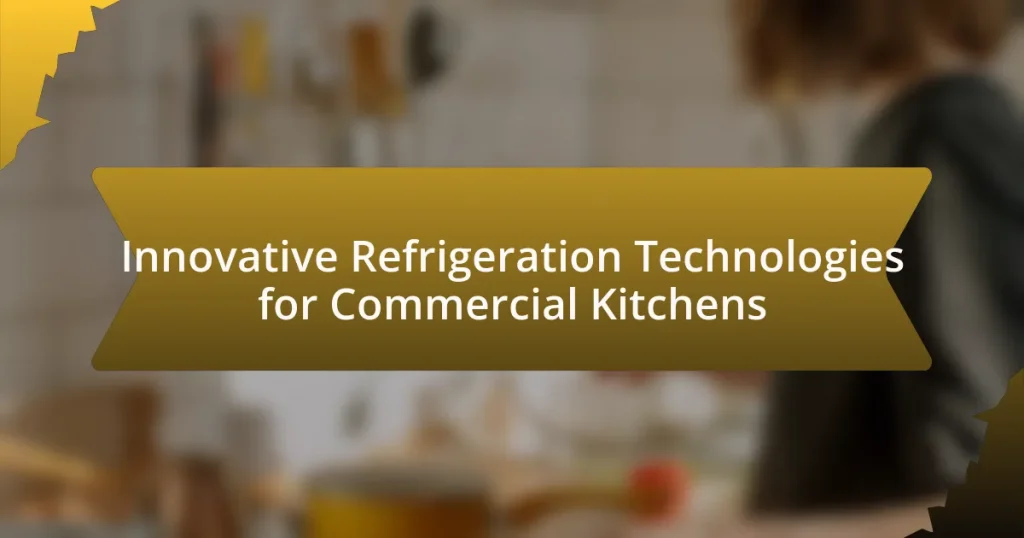The article focuses on the significant role of technology in custom catering solutions, highlighting its impact on efficiency, personalization, and customer engagement. It discusses how various technologies, such as online ordering systems, inventory management software, and data analytics tools, streamline operations and enhance customer experiences. The article also examines the transformation of the catering industry through technological advancements, the specific technologies utilized, and the advantages they provide to caterers. Additionally, it addresses the challenges faced during technology adoption and explores future trends that could further enhance catering services.
What is the Role of Technology in Custom Catering Solutions?
Technology plays a crucial role in custom catering solutions by enhancing efficiency, personalization, and customer engagement. It enables caterers to streamline operations through software for inventory management, order processing, and scheduling, which reduces errors and saves time. Additionally, technology facilitates personalized experiences by allowing clients to customize menus and services through online platforms, ensuring that specific dietary needs and preferences are met. Furthermore, data analytics tools help caterers understand customer preferences and trends, enabling them to tailor offerings effectively. The integration of technology in custom catering not only improves service delivery but also enhances customer satisfaction and loyalty.
How has technology transformed the catering industry?
Technology has transformed the catering industry by streamlining operations, enhancing customer engagement, and improving food quality. Digital tools such as online ordering systems and mobile apps have made it easier for customers to place orders and customize their catering needs, leading to increased efficiency and satisfaction. Additionally, advancements in kitchen equipment, such as smart ovens and inventory management software, have allowed caterers to optimize food preparation and reduce waste. According to a report by Technomic, 70% of caterers have adopted technology to improve service delivery, demonstrating its significant impact on the industry.
What specific technologies are being utilized in custom catering?
Custom catering utilizes several specific technologies, including online ordering systems, mobile apps, inventory management software, and event management platforms. Online ordering systems streamline the process for clients to select menu items and customize their orders, enhancing user experience and efficiency. Mobile apps facilitate real-time communication between caterers and clients, allowing for updates and changes on-the-go. Inventory management software helps caterers track supplies and reduce waste, ensuring that ingredients are available when needed. Event management platforms assist in coordinating logistics, scheduling, and staffing for catering events, improving overall organization and execution. These technologies collectively enhance operational efficiency and customer satisfaction in the custom catering industry.
How do these technologies enhance customer experience?
Technologies enhance customer experience in custom catering solutions by providing personalized services, improving communication, and streamlining operations. For instance, advanced software allows catering companies to tailor menus based on individual preferences and dietary restrictions, ensuring that each customer receives a unique experience. Additionally, real-time communication tools enable instant feedback and adjustments, fostering a responsive service environment. According to a study by the National Restaurant Association, 70% of consumers are more likely to choose a catering service that offers personalized options, highlighting the importance of technology in meeting customer expectations.
Why is technology important for custom catering businesses?
Technology is important for custom catering businesses because it enhances operational efficiency and improves customer experience. By utilizing software for order management, catering companies can streamline processes, reduce errors, and manage inventory effectively. For instance, a study by the National Restaurant Association found that 70% of restaurants that adopted technology reported increased efficiency in their operations. Additionally, technology facilitates better communication with clients through online platforms, enabling real-time updates and personalized service, which is crucial in the competitive catering market.
What advantages does technology provide to caterers?
Technology provides caterers with enhanced efficiency, improved communication, and better customer service. By utilizing software for inventory management, caterers can streamline their operations, reducing waste and ensuring timely deliveries. Additionally, technology facilitates real-time communication with clients through online platforms, allowing for quick adjustments to orders and preferences. Furthermore, data analytics tools enable caterers to analyze customer preferences and trends, leading to more personalized service and menu offerings. These advantages collectively contribute to increased customer satisfaction and operational effectiveness in the catering industry.
How does technology improve operational efficiency in catering?
Technology improves operational efficiency in catering by streamlining processes, enhancing communication, and optimizing resource management. For instance, catering management software automates scheduling, inventory tracking, and order processing, reducing manual errors and saving time. Additionally, mobile applications facilitate real-time communication between staff and clients, ensuring timely updates and adjustments. According to a study by the National Restaurant Association, 70% of restaurant operators reported that technology has improved their operational efficiency, highlighting its significant impact on the catering industry.
What are the key technologies used in Custom Catering Solutions?
Key technologies used in Custom Catering Solutions include online ordering systems, inventory management software, and event management platforms. Online ordering systems facilitate customer engagement and streamline the ordering process, allowing clients to customize their menus easily. Inventory management software ensures efficient tracking of ingredients and supplies, reducing waste and optimizing costs. Event management platforms assist in coordinating logistics, scheduling, and communication, enhancing overall service delivery. These technologies collectively improve operational efficiency and customer satisfaction in the catering industry.
How do online ordering systems impact custom catering?
Online ordering systems significantly enhance custom catering by streamlining the ordering process and improving customer experience. These systems allow clients to easily select menu items, customize orders, and specify delivery details, which increases efficiency and accuracy in fulfilling catering requests. According to a study by the National Restaurant Association, 70% of consumers prefer online ordering for its convenience, indicating a strong demand for such systems in the catering industry. Additionally, online platforms enable caterers to manage orders in real-time, reducing the likelihood of errors and ensuring timely service, which is crucial for events.
What features should an effective online ordering system have?
An effective online ordering system should have user-friendly navigation, secure payment processing, real-time order tracking, and customizable menu options. User-friendly navigation ensures that customers can easily browse and select items, which increases conversion rates. Secure payment processing is crucial for protecting customer data and building trust, as studies show that 70% of online shoppers abandon their carts due to security concerns. Real-time order tracking enhances customer satisfaction by providing updates on order status, while customizable menu options allow customers to tailor their orders to specific preferences, catering to diverse dietary needs. These features collectively improve the overall user experience and operational efficiency in custom catering solutions.
How do online reviews influence customer choices in catering?
Online reviews significantly influence customer choices in catering by shaping perceptions of quality and service. Customers often rely on the experiences shared by others to gauge the reliability and reputation of catering services. Research indicates that approximately 84% of people trust online reviews as much as personal recommendations, highlighting their impact on decision-making. Positive reviews can enhance a catering business’s credibility, while negative reviews can deter potential clients, ultimately affecting sales and customer loyalty.
What role does data analytics play in custom catering?
Data analytics plays a crucial role in custom catering by enabling businesses to analyze customer preferences and optimize menu offerings. By leveraging data from past events, customer feedback, and market trends, catering companies can tailor their services to meet specific client needs, enhancing customer satisfaction and loyalty. For instance, a study by the National Restaurant Association indicates that 70% of consumers are more likely to choose a catering service that offers personalized options based on their preferences. This data-driven approach not only improves the customer experience but also increases operational efficiency by minimizing food waste and maximizing resource allocation.
How can data analytics improve menu planning and inventory management?
Data analytics can significantly enhance menu planning and inventory management by providing insights into customer preferences and optimizing stock levels. By analyzing historical sales data, catering businesses can identify popular dishes and seasonal trends, allowing them to tailor menus that meet customer demand effectively. Additionally, data analytics helps in forecasting inventory needs, reducing waste and ensuring that ingredients are available when required. For instance, a study by the National Restaurant Association found that restaurants using data analytics for inventory management reduced food waste by up to 30%, demonstrating the tangible benefits of this approach.
What insights can caterers gain from customer data?
Caterers can gain valuable insights from customer data, including preferences, spending habits, and feedback on services. Analyzing this data allows caterers to tailor their offerings to meet specific customer needs, enhancing satisfaction and loyalty. For instance, data on past orders can reveal popular menu items, enabling caterers to optimize their inventory and reduce waste. Additionally, customer feedback can highlight areas for improvement, guiding service enhancements. According to a study by the National Restaurant Association, 70% of consumers are more likely to return to a restaurant that personalizes their experience, underscoring the importance of leveraging customer data for better service.
How can caterers effectively implement technology in their services?
Caterers can effectively implement technology in their services by utilizing software solutions for event management, online ordering systems, and customer relationship management (CRM) tools. These technologies streamline operations, enhance customer experience, and improve communication. For instance, event management software allows caterers to manage bookings, track inventory, and coordinate staff efficiently, leading to reduced errors and increased productivity. Online ordering systems enable customers to place orders easily, which can increase sales and customer satisfaction. Additionally, CRM tools help caterers maintain customer data, enabling personalized marketing and improved service delivery. According to a study by the National Restaurant Association, 70% of restaurants that adopted technology reported improved operational efficiency, highlighting the effectiveness of technology in the catering industry.
What are the best practices for integrating technology into catering operations?
The best practices for integrating technology into catering operations include adopting comprehensive catering management software, utilizing online ordering systems, and implementing inventory management tools. Catering management software streamlines event planning, scheduling, and communication, enhancing operational efficiency. Online ordering systems facilitate customer engagement and simplify the ordering process, leading to increased sales and customer satisfaction. Inventory management tools help track stock levels in real-time, reducing waste and ensuring that ingredients are always available. According to a study by the National Restaurant Association, 70% of restaurants that adopted technology reported improved operational efficiency, demonstrating the effectiveness of these practices in catering operations.
How can staff be trained to use new technologies effectively?
Staff can be trained to use new technologies effectively through structured training programs that include hands-on practice, clear instructional materials, and ongoing support. These programs should incorporate real-world scenarios relevant to custom catering solutions, allowing staff to engage with the technology in a practical context. Research indicates that training that combines theoretical knowledge with practical application enhances retention and proficiency; for instance, a study by the American Society for Training and Development found that 70% of learning occurs through experiential methods. Additionally, providing access to resources such as video tutorials and user manuals can further reinforce learning and facilitate the adoption of new technologies in the workplace.
What common challenges do caterers face when adopting technology?
Caterers commonly face challenges such as high costs, resistance to change, and lack of technical expertise when adopting technology. High costs can deter caterers from investing in new systems, as initial expenses for software, hardware, and training can be significant. Resistance to change often arises from staff who are accustomed to traditional methods, leading to reluctance in embracing new technologies. Additionally, a lack of technical expertise can hinder effective implementation and utilization of technology, as many caterers may not have the necessary skills or knowledge to operate advanced systems efficiently. These challenges can impede the successful integration of technology into catering operations.
What future trends in technology should caterers be aware of?
Caterers should be aware of several future technology trends, including automation, artificial intelligence, and sustainable practices. Automation, such as robotic kitchen assistants and automated ordering systems, can enhance efficiency and reduce labor costs. Artificial intelligence can improve menu personalization and inventory management by analyzing customer preferences and predicting demand. Additionally, the trend towards sustainability is driving the adoption of eco-friendly technologies, such as energy-efficient appliances and waste reduction systems, which caterers can implement to meet consumer demand for environmentally responsible practices. These trends are supported by industry reports indicating that automation and AI are expected to grow significantly in the food service sector, with a projected market size of $12.5 billion for AI in food service by 2024.
How might artificial intelligence change the landscape of custom catering?
Artificial intelligence will significantly transform the landscape of custom catering by enhancing personalization, optimizing logistics, and improving customer engagement. AI algorithms can analyze customer preferences and dietary restrictions to create tailored menus, ensuring that offerings align closely with individual tastes. Additionally, AI can streamline inventory management and delivery processes, reducing waste and improving efficiency. For instance, predictive analytics can forecast demand based on historical data, allowing caterers to adjust their supply accordingly. This data-driven approach not only minimizes costs but also enhances service quality, leading to higher customer satisfaction.
What emerging technologies could enhance catering services in the next decade?
Emerging technologies that could enhance catering services in the next decade include artificial intelligence, automation, and blockchain. Artificial intelligence can optimize menu planning and inventory management by analyzing customer preferences and predicting demand, leading to reduced waste and increased customer satisfaction. Automation, such as robotic chefs and delivery drones, can streamline food preparation and delivery processes, improving efficiency and reducing labor costs. Blockchain technology can enhance transparency in the supply chain, ensuring food safety and traceability, which is increasingly important to consumers. These technologies collectively contribute to more efficient, personalized, and transparent catering services.
What practical tips can caterers follow to leverage technology successfully?
Caterers can successfully leverage technology by implementing online ordering systems, utilizing catering management software, and engaging with social media platforms. Online ordering systems streamline the booking process, allowing clients to easily select menu items and place orders, which can increase efficiency and customer satisfaction. Catering management software helps caterers manage logistics, track inventory, and schedule staff, leading to improved operational efficiency. Engaging with social media platforms enables caterers to showcase their offerings, connect with clients, and gather feedback, which can enhance brand visibility and customer engagement. These strategies are supported by industry trends indicating that 70% of consumers prefer online ordering for convenience, and businesses that utilize management software report a 30% increase in operational efficiency.



